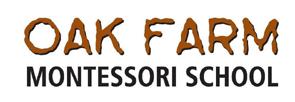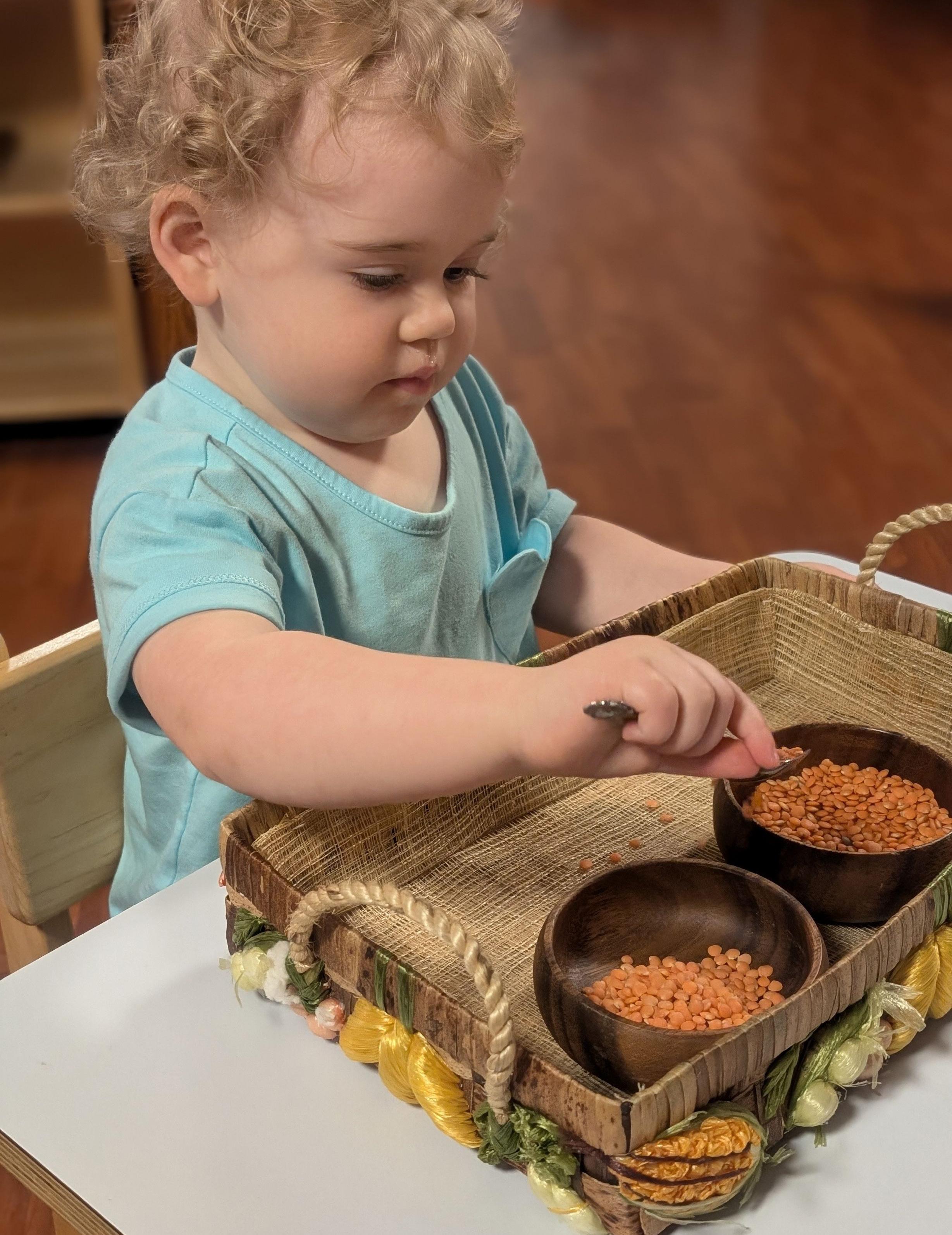

Oak Farm Montessori
November 2024

We’ve all uttered the phrase, “Take care of yourself!” But in a Montessori classroom, those words have a complex meaning and are subject to various forms of interpretation. As we look at the three principles taught in all of our classrooms: care of the environment, care of self, and care of others, this month we are looking closely at care of self and how it is encouraged and developed at each level.
Foundationally, Dr. Montessori believed children should be taught to become physically independent. This includes dressing themselves, washing their hands and bodies, teeth and hair, feeding themselves, and toileting independently. To accomplish these tasks, she saw the importance of child sized tools and equipment to empower them to be successful. While our classrooms include sinks, counters, toilets, and stoves at the appropriate heights for the children they serve, you can easily accomplish the same success by utilizing a sturdy step stool near a counter or setting up a workstation at your child’s level for them to complete tasks alongside you.
Self care is not always physical though, it is also emotional and mental as well. Did you know that all of our classrooms offer a peace area so that students can choose to reset, meditate, read, or just sit silently? Sometimes, the child instinctively knows they need this space, other times a friend or teacher may suggest this area of the classroom. As children mature, they may actively seek out a mentor, friend, or teacher to talk to about a problem or concern. The important aspect of this decision though, is that they have learned, through practice, that care of self is unique and individualized.
But how does knowing how to care for oneself affect the long term success of my child you might ask. The list is quite lengthy, but consider the most obvious. Confidence: the freedom and choice Montessori children are given daily, builds decision making skills and independence. Executive Functioning: Students are asked to prioritize their work and set their own timelines, while also setting goals and controlling impulses. Self-Esteem: Our classrooms and teachers provide a Montessori environment that inspires students to reach their potential, everyone is part of this community.
So, as you read through the various ways our faculty support care of self in the classrooms of Oak Farm Montessori School, take a moment to visualize what this phrase means to you and how it can be an intentional part of your home as this busy holiday season approaches.
Candice
HEAD OF SCHOOL
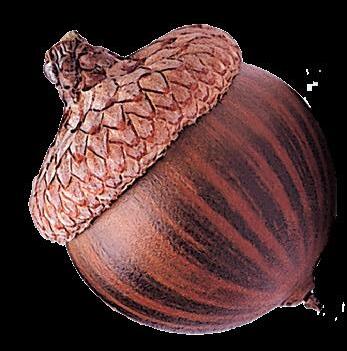
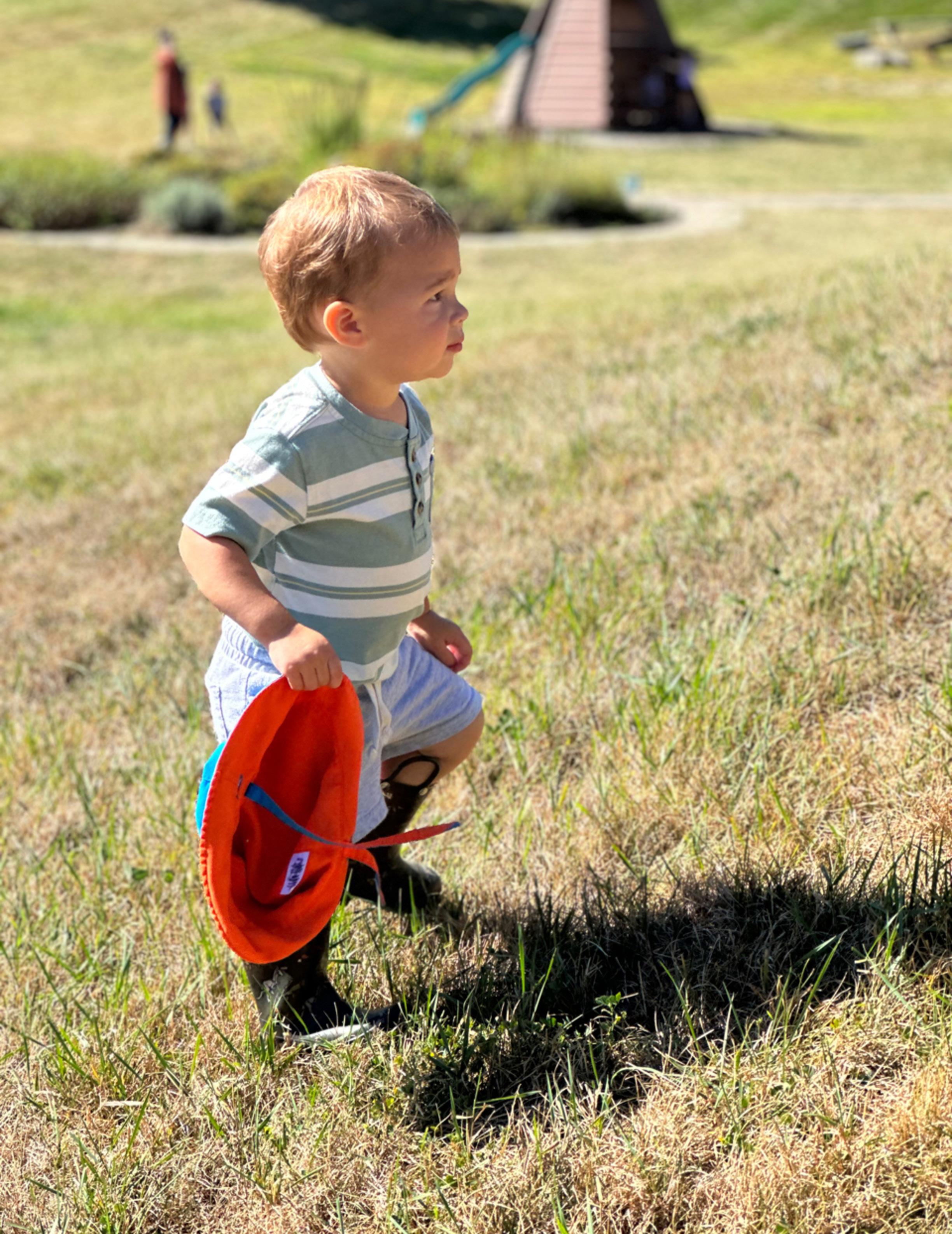
Steps to independence
Sarah Bosworth, Toddler 2 Teacher
One of the most exciting things that we get to witness in the toddler environment is for the child to grow independence in their care of self routine. We work with them to establish the routines that will set the foundation for the rest of their lives. As adults, we often take for granted how much we once had to learn and work hard to accomplish, tasks that we now do with little thought and as reflex actions.
As the children are working on mastering these tasks, it can be easy to want to step in and to offer help when you see them start to struggle in getting their coat on or pants pulled up. The challenge as an adult comes in realizing when it is time to jump in and offer assistance, and when to allow for the child to push through so we can hear that exclamation of, “I did it!” The child is always so much more excited and proud when they accomplish the task on their own, than when it is done for them by an adult. While the learning of being able to do the task is important, there is also a great deal of confidence building that the child receives as well.
There are three important things you can remember when evaluating if your child is ready to take on self care steps on their own. First, watch and observe for a readiness to want to do the task independently. Then, set your child up for success as best you can, such as having the clothes at their level or the coat laid out for them to put their arms in and flip over their head. And, lastly, to follow the child. When you see them show an interest in toileting or dressing themselves, let them follow that drive. Provide the opportunity for them to follow their sensitive periods and to want to accomplish tasks that will aid them in being able to learn effortlessly, and with little push back from the child.

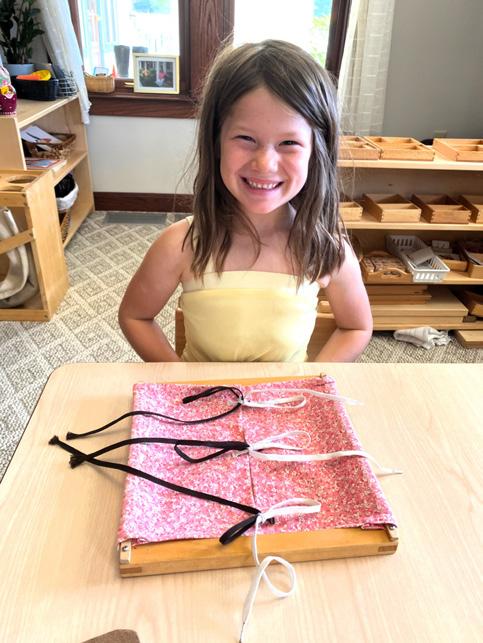
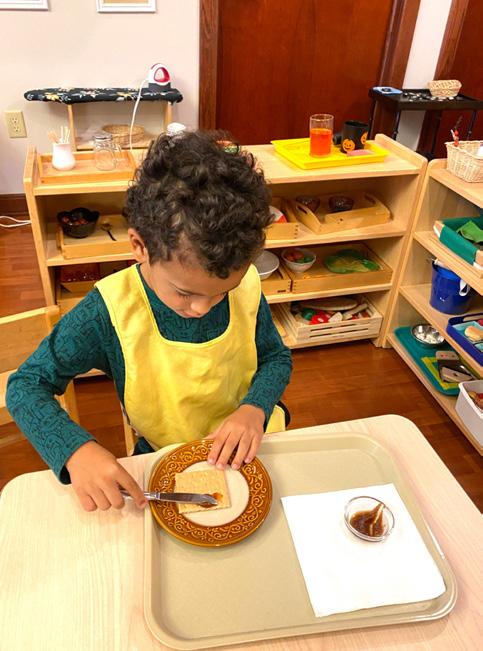
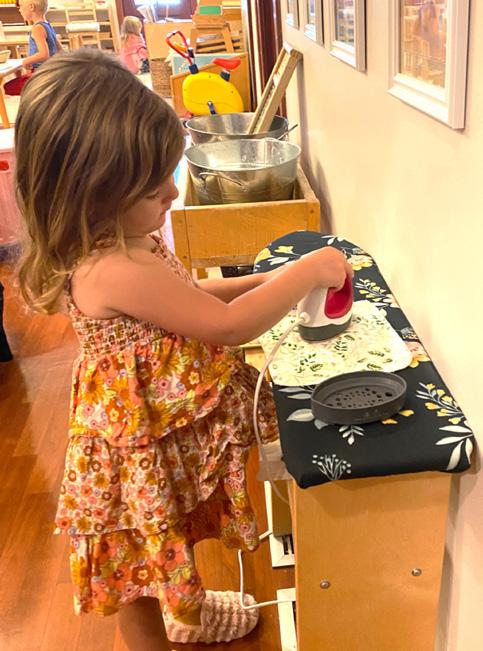
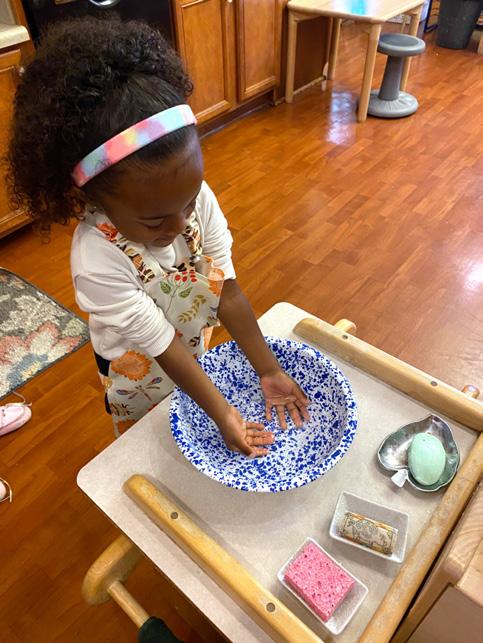

Nurturing a sense of satisfaction
Laura zollman, primary 1 teacher
“I did it!” These are the best words to hear a child say. There is so much meaning packed into that little phrase. It means that a parent or teacher allowed room for growth and experimentation. It means that both child and adult exercised patience. It means that failures happened. It means that independence took hold. It means that a child learned success, and it means they took responsibility for their own success. All of these things are so meaningful in the life of a child. As Maria Montessori said, “Any child who is self-sufficient, who can tie his shoes, dress or undress himself, reflects in his joy and sense of achievement and the image of human dignity, which is derived from a sense of independence.”
Care of self is second in our guiding principles at Oak Farm Montessori School. At the primary level, we recognize that care of the environment, care of self, and care of others are essential elements in the bigger picture of a community. By encouraging students to manage their own self-care, care of the environment around them, and care of others, we know we are building a strong community with responsible citizens.
Students’ first responsibilities in a school day involve taking care of their coat, backpack and shoes. Each primary student learns to carefully hang their backpack on a hook with their coat, remove their shoes, and place their slippers on their feet before entering the classroom. As their day continues, they build upon those elements of self-care by toileting, tying their shoes, zipping their coats, washing their hands and face, and controlling their movements throughout the classroom. Care of self, in the life of a child is a full-time job. Primary materials, such as the dressing frames, ironing, and sewing, support the skills involved in care of self. The magic happens when children are able to regulate their movements and focus their concentration on practicing the simple tasks of self-care.
As adults, we can offer a safe place at home, and at school, for children to practice caring for themselves. Delay asking the question, “Can I help you with that?” Instead, count to ten when your child is struggling with their zipper and consider the phrase, “Let me show you.” You can try hand over hand if needed, or simply model how to use the zipper. Then, you will get to use that beautiful phrase and say, “You did it!”
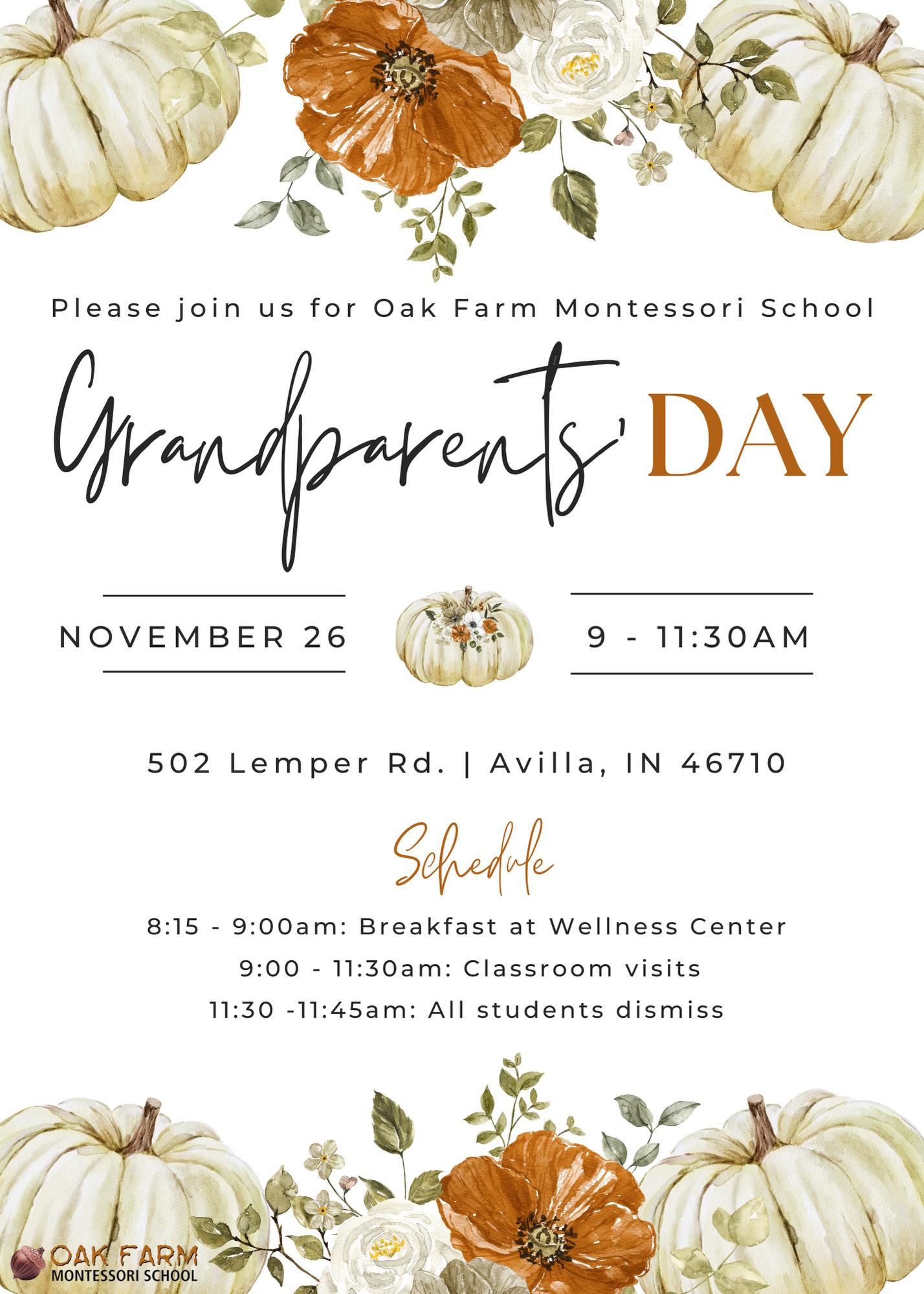

urposeful wo r k
Mindful practices
ines oldenburg, lower eleMentary 2 teacher
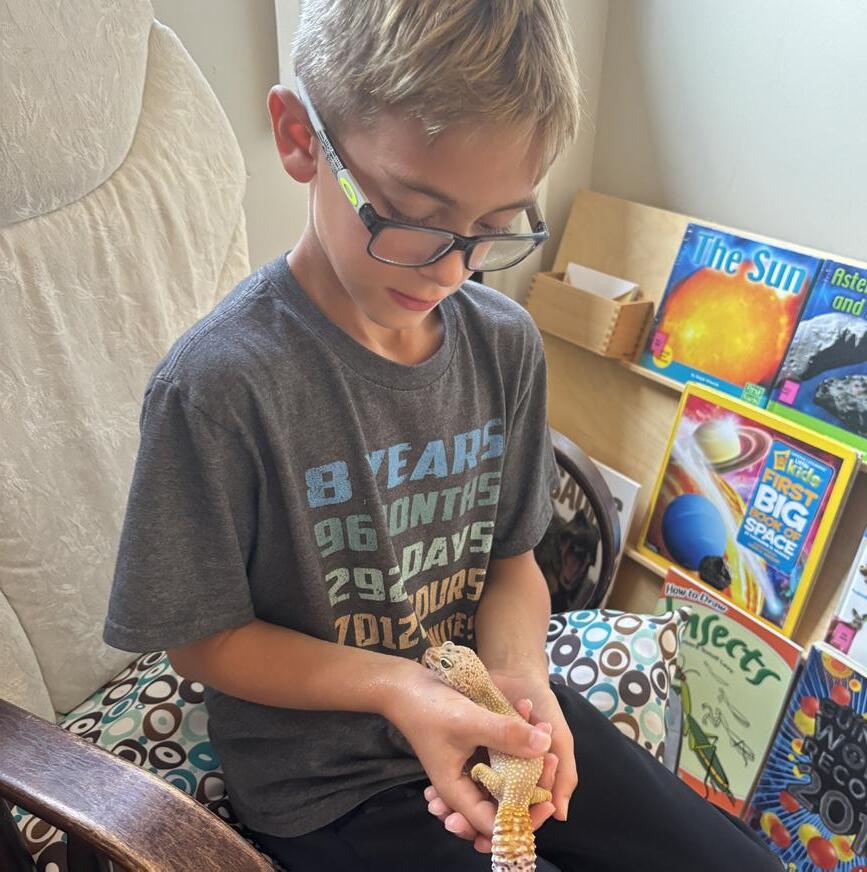

In a Montessori environment, students are guided to take care of themselves, both physically and emotionally; fostering independence and self-regulation from a young age. Through intentional practice and the use of materials, designed to engage their hands and minds, children learn how to recognize their emotions, manage impulses, and develop the ability to concentrate for longer periods.The lower elementary environment offers them space for quiet reflection and self-paced work, which helps them regulate their emotions and respond to challenges calmly. As teachers, we support them in identifying coping strategies, such as deep breathing, taking breaks, or engaging in focused tasks, like reading, to help manage frustration or excitement. This process is gradual, but it builds essential neurological pathways that support emotional resilience and cognitive flexibility.
In lower elementary, children are still mastering fundamental self-care skills that build independence, such as preparing simple snacks, dressing themselves, or keeping their workspace organized. These activities, while seemingly simple, strengthen executive function skills like planning, organization, and problemsolving. By encouraging them to take ownership of these tasks, they also build self-confidence and learn to advocate for themselves in appropriate ways. Over time, their ability to focus improves, and they become more aware of their physical and emotional needs, fostering a deep sense of self-responsibility and autonomy. The repetitive nature of these tasks, along with the freedom to practice them in a supportive environment, plays a critical role in the development of their neurological abilities, including the brain’s capacity for self-regulation, attention control, and emotional processing. In today’s fast-paced world, where both parents and children often have packed schedules, it’s more important than ever to intentionally set aside time for self-care. Parents can model this at home by making it a regular part of the daily routine.
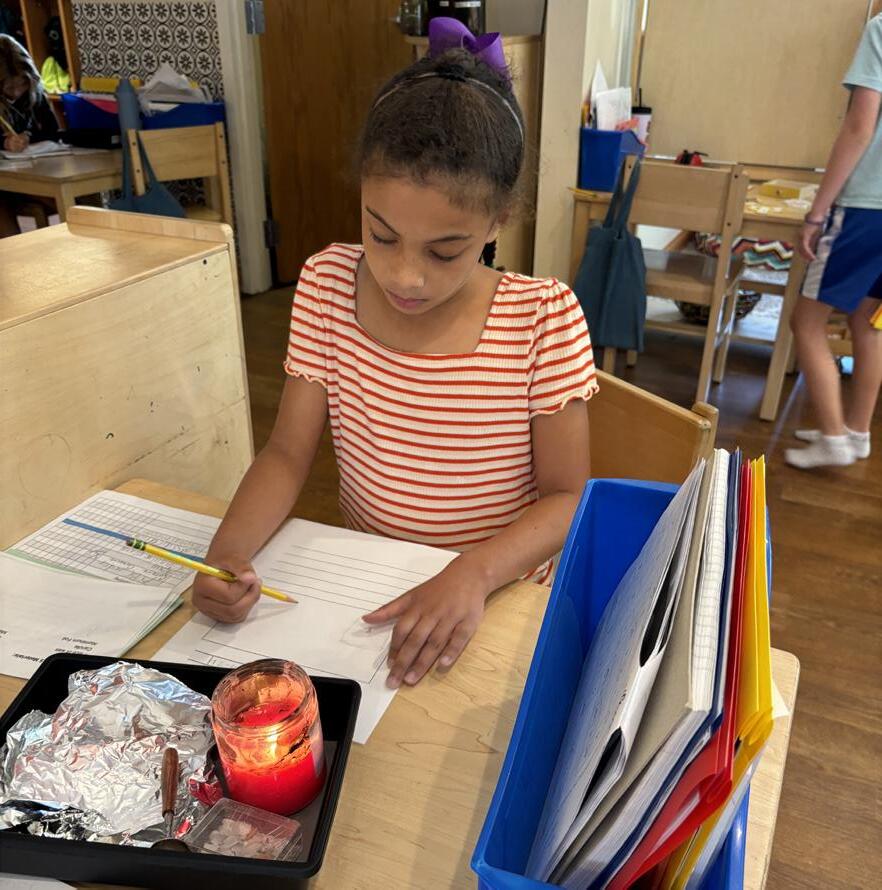
In the past, children were raised in multigenerational households where they played an active role in household chores. Though chores are often seen as a burden, it’s important to remember the valuable lessons they offer. Practical life skills not only teach responsibility, but also give children a sense of purpose, as they learn to contribute to the well-being of others and feel valued for their efforts.
A place where CHOICE matters
Alex Balle, Librarian
The use of a library is inherently all about choice: what shelves to explore, where to sit to enjoy a cozy read, what books to select to take home and enjoy. The Oak Farm Montessori libraries are no different and are used by the students as independently as possible, and as early of an age as possible. Library formally begins at the primary level with the librarian both pushing into the classroom to read and give lessons to the children, as well as pulling students who are ready to come down to the library and begin practicing exploring the library space and checking out books.
When they transition to lower elementary, library work increases with weekly lessons in addition to open library visits. Lower library lessons include an in depth look at the Dewey Decimal system, spanning all three years. There is also a focus on history months and award winning books. As the students are older, they are able to check out two books at a time and are able to decide if they wish to come to the open library check out time or not.
The independence and choice continues at Upper Elementary. Upper students learn how to set up and utilize the library computer as they are able to visit the library when the librarian isn’t there. This access continues into the secondary level. It is also in Upper that students gain access to the online database, Gale. Gale provides reliable sources to students in Upper through High School. Gale becomes helpful as the research the students do becomes more advanced and they have more choice about what they wish to learn.
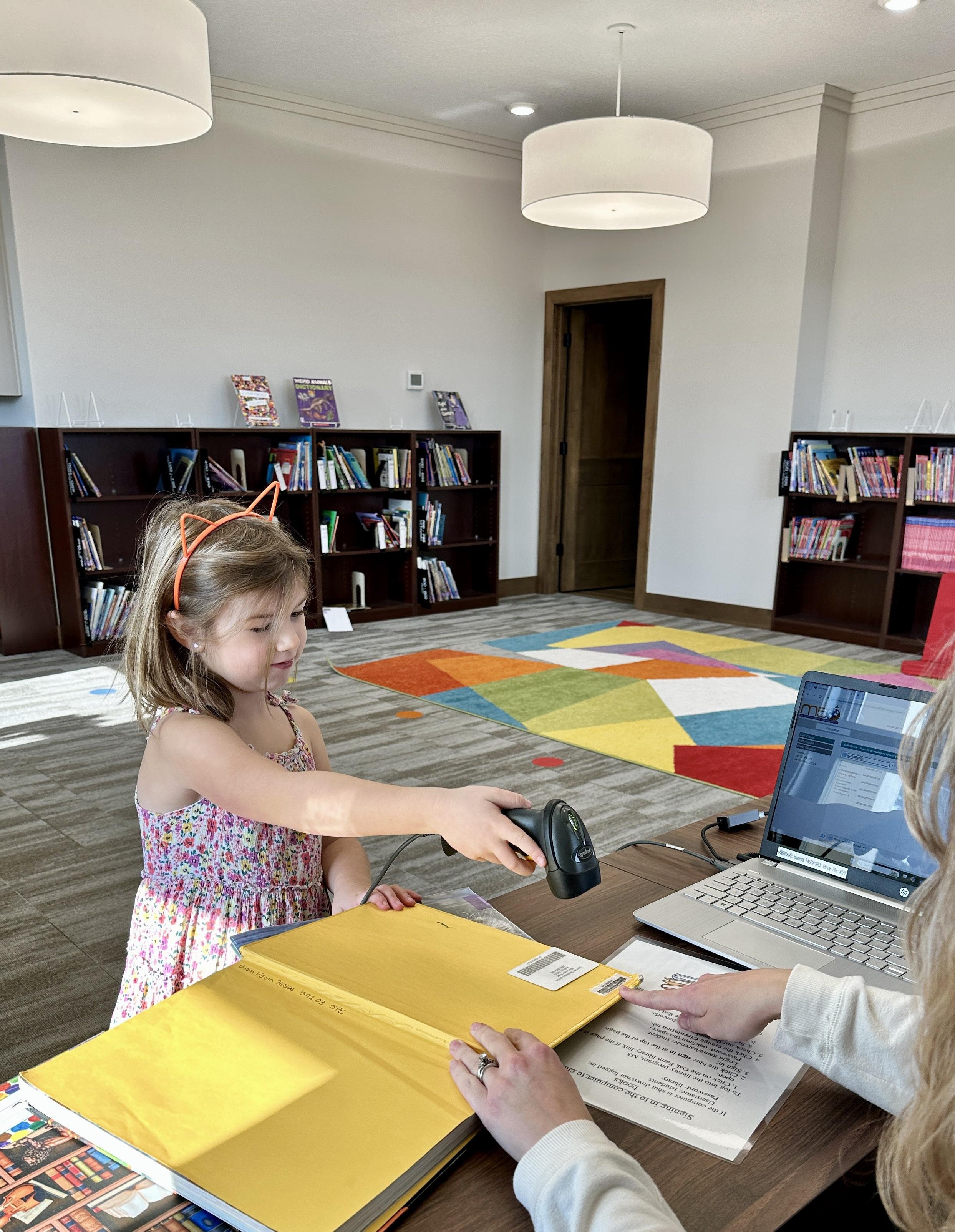

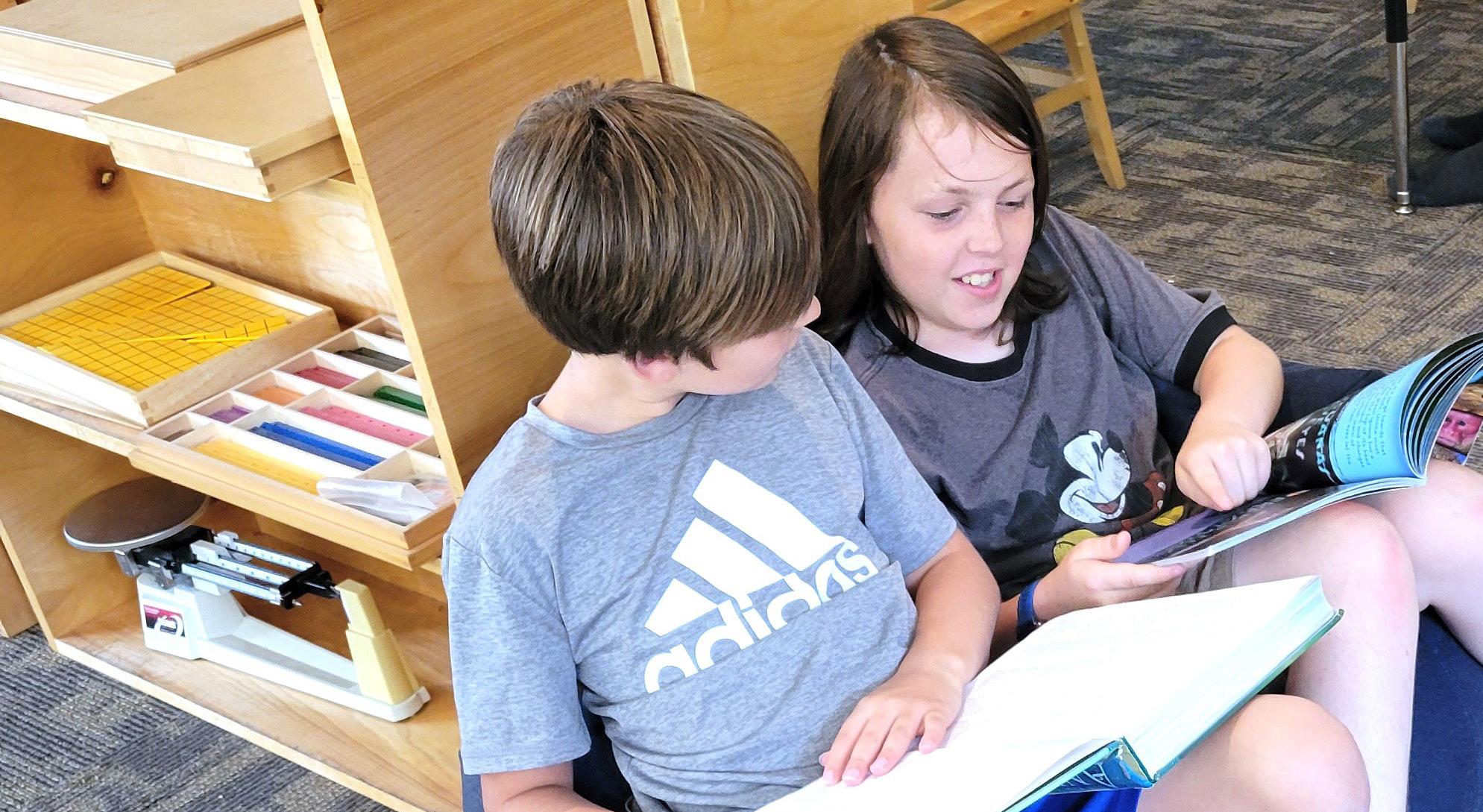
The Montessori approach encourages children to make choices within a prepared environment. Self care in upper elementary is the freedom to make a series of choices such as: snack, planning their learning, brain break activities, as well as other needs. This autonomy fosters a sense of independence and allows children to develop decision-making skills and to gain independence.
In the Montessori educational philosophy, care of self is a fundamental principle, especially emphasized in the early years of development. As students transition into the upper elementary classroom (ages 9-12), they move to the second plane of development. In this plane, students are more aware of their social and emotional needs. Children are ready to assume more responsibility for their well-being, independence, and personal growth. This is something that Montessori guides support students with to nurture self-sufficient, confident, and mindful citizens of their community. In the upper elementary classroom, students are responsible for maintaining their personal hygiene, organizing their workspaces, and managing their belongings, including packing their own materials and lunches.
Care of self also encompasses creating an
environment where students can focus on their work. They learn to manage distractions and create routines that promote concentration and productivity. As guides, we support a student’s executive functioning skills to move them toward success. Having organized materials and maintaining a clutter-free workspace is emphasized as part of a healthy learning environment.
Advocating for oneself is something that is encouraged in the Upper Montessori classroom as well. As children in this age group are entering a stage of greater emotional complexity and social awareness, they are encouraged to explore and reflect on their feelings and interactions. This can get tricky when it comes to friendships as this is a pivotal time for them to experience conflict with direction from their teachers. A peace corner is a staple in every classroom so that children can find a place to practice mindfulness, coping mechanisms, and explore their feelings of frustration in a safe place.
Care of self in this context means understanding one’s own learning process—knowing when to ask for help, recognizing strengths and areas for improvement, and being aware of the location of
A Window into Responsibility
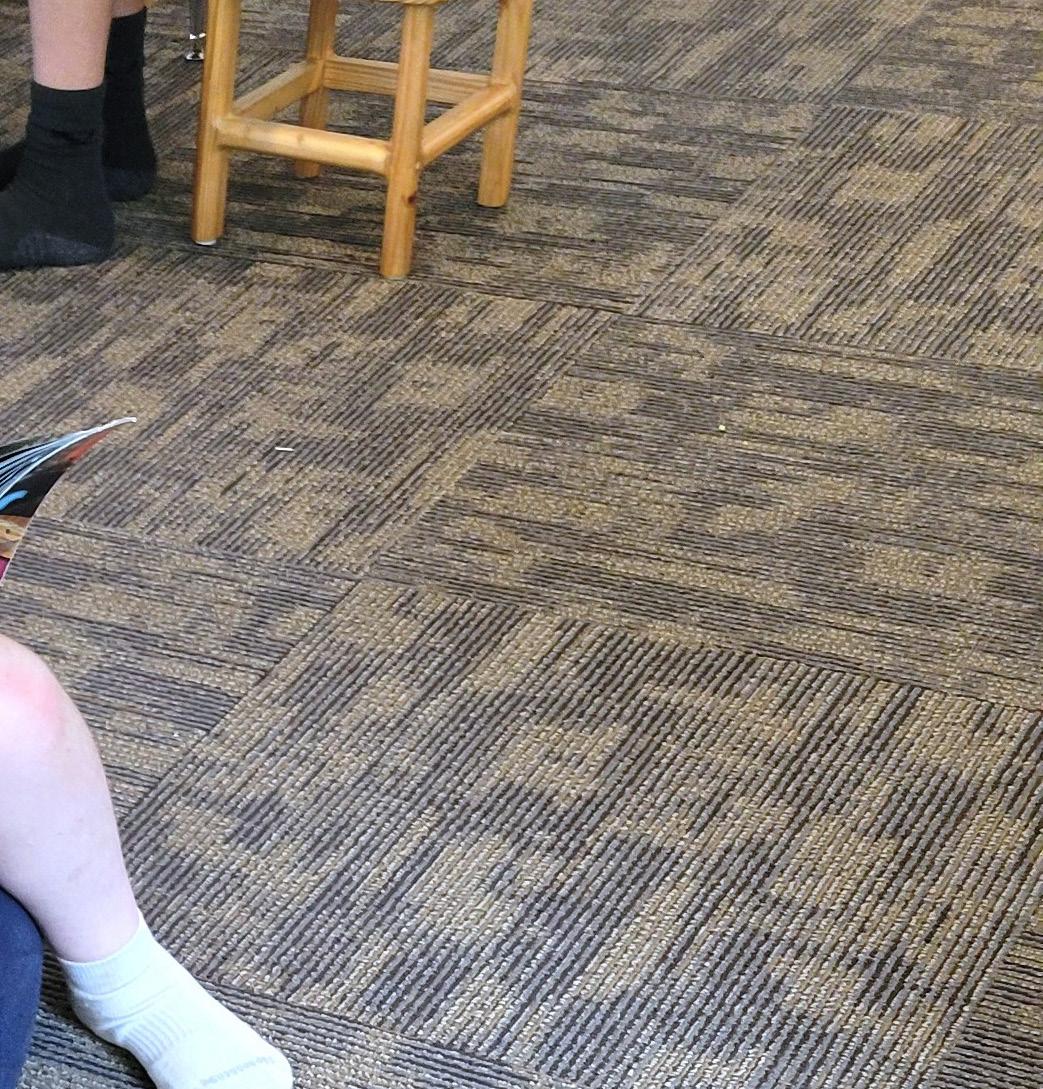
necessary resources. Students are encouraged to develop intrinsic motivation and a growth mindset, appreciating that effort and perseverance lead to intellectual growth.
Ways to encourage care of self at home would be to focus on activities that promote independent selfcare routines. For example, choosing appropriate clothing, dressing themselves fully, managing personal hygiene (washing hands, brushing teeth), organizing belongings, preparing their own snacks, keeping track of their schedules, making a shopping list of needs, and taking responsibility for their space in the home.
Care of self in the Montessori upper elementary classroom equips students with the tools to navigate physical, emotional, and intellectual challenges. By focusing on autonomy, responsibility, and mindfulness, students are guided toward a deeper understanding of themselves and their place in the world. These skills lay the foundation for lifelong self-care, fostering independence, resilience, and a strong sense of well-being. As students mature, they carry these lessons with them, growing into self-aware, compassionate individuals; capable of caring for themselves and becoming contributing members of society.

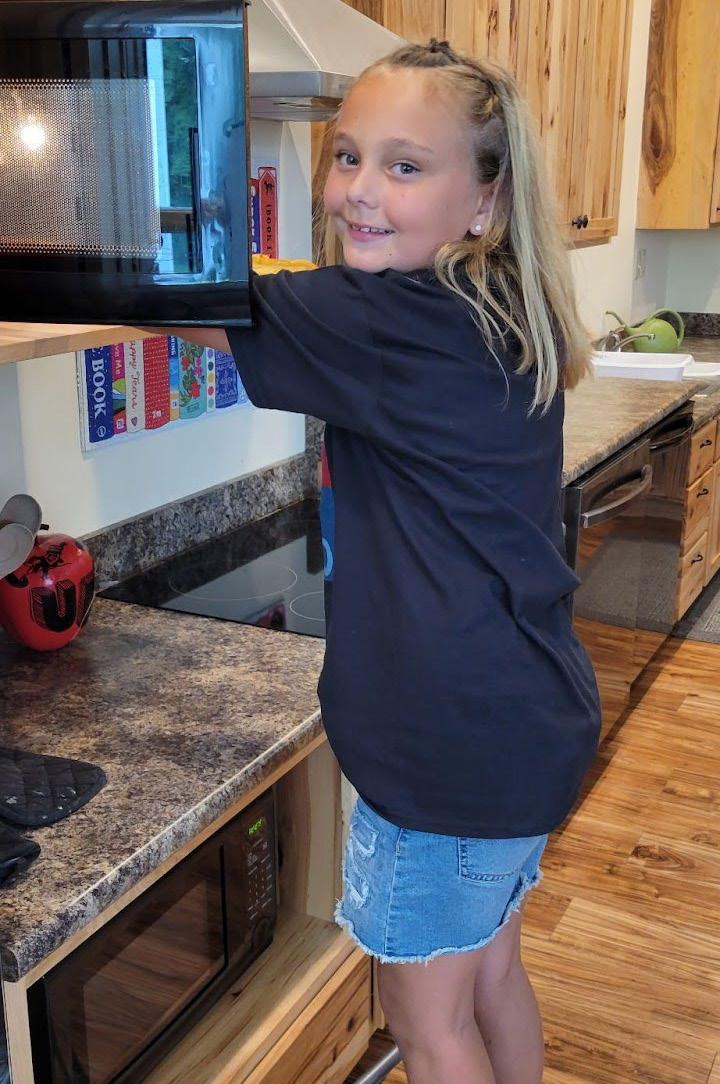

April vanosdale, ue3 teacher



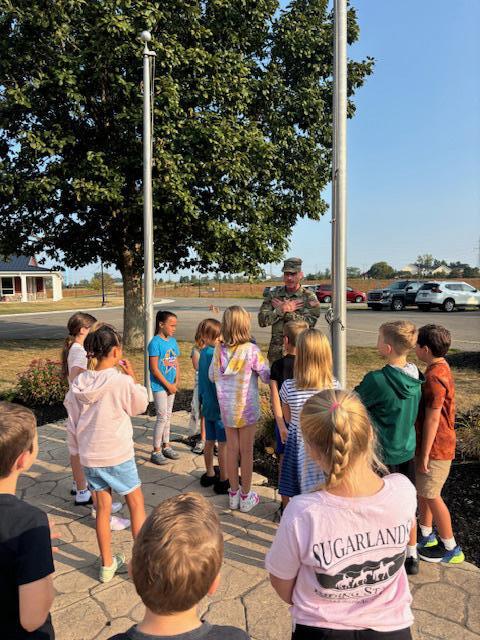

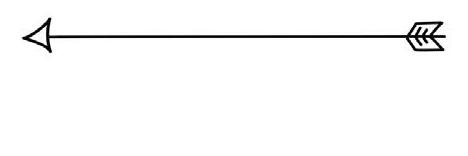
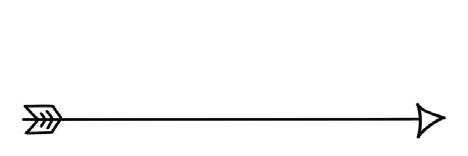
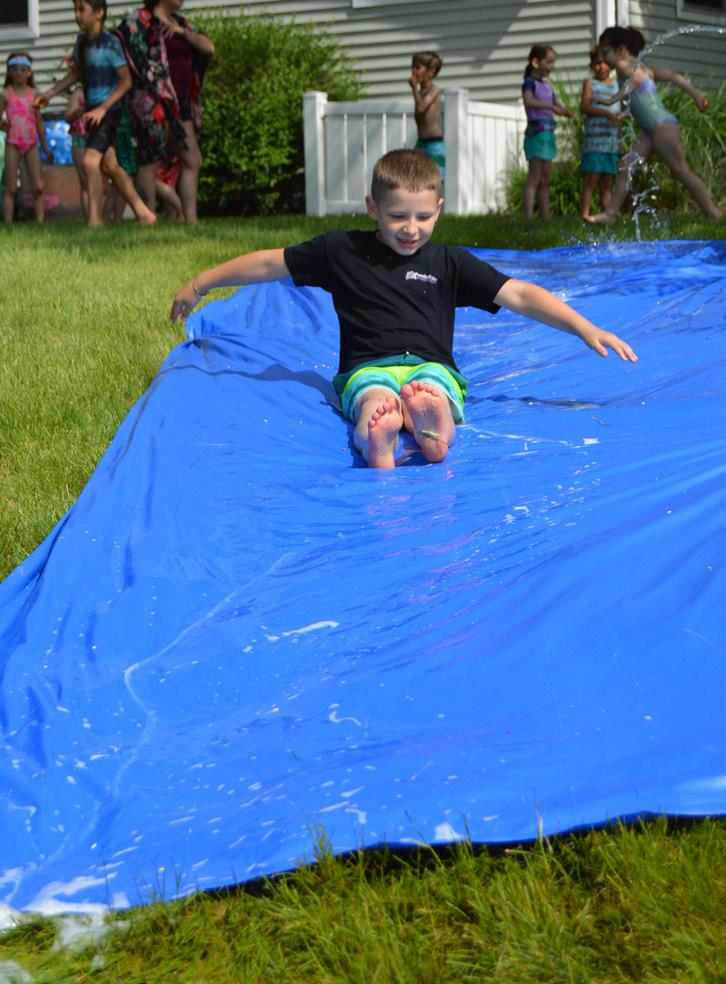

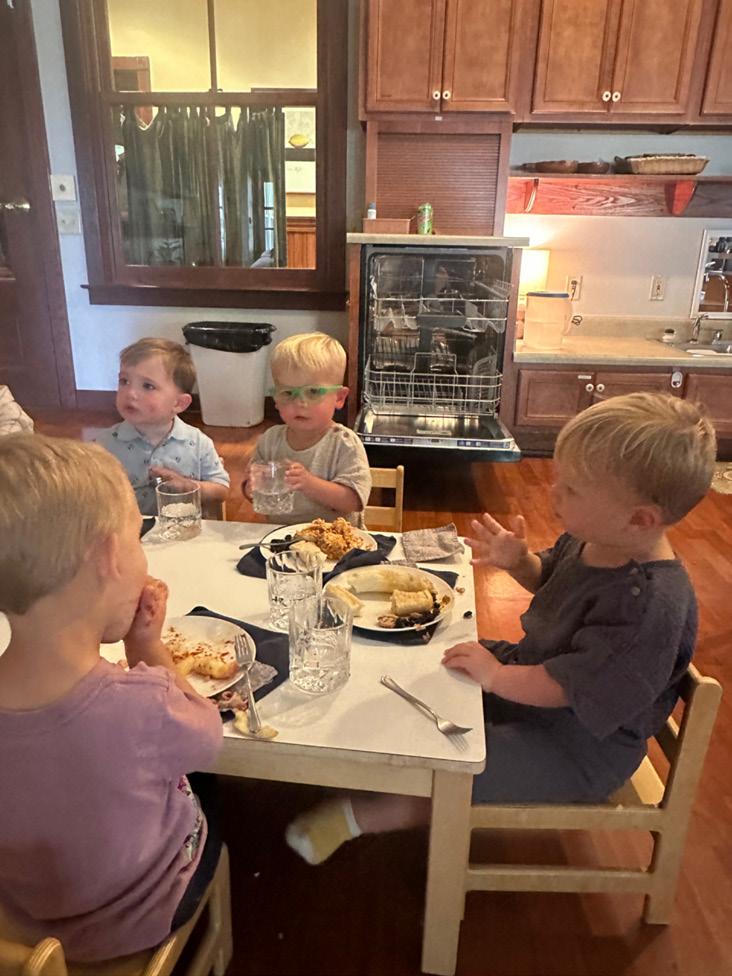
Kim Davidson, Strategic Partnership Director
“Our family’s lives would not be the same without her life’s work.”
In late September, I had the opportunity to show Lorene’s niece, Paige, her husband Casey, and their son, Will, around our campus. In talking with Paige about what she knew about Oak Farm Montesori and what she hoped to learn during her visit, her answer was very simple: “I know that my aunt had a vision.” As we walked the campus and visited classrooms, I was reminded of just how much our school community still holds true to Lorene’s vision. While some things have evolved over time, due to the school’s growth, the roots of so many things are still present as one walks through campus.
Home-like classrooms and buildings with quality, real-world materials. It was important that the rooms be home-like and welcoming. Materials were to be real, glass instead of plastic, tools would be metal or wood (i.e. rakes, hammer, shovels etc.), and each classroom would be designed to meet the needs of the students, not the adults. Students would also use porcelain plates and bowls, metal utensils, and glass during lunch and snack.
Decentralized library: Lorene felt it was important for students to have access to books; and for this reason, every academic building on campus has its own library. Beginning in primary, all students are taught how to use the library software independently to check out books.
Sledding: Lorene’s childhood home is a popular sledding spot in Kendallville, which may be one reason she always loved to sled. From the beginning, sledding has been a much loved tradition at OFMS. Both at the Victorian Farmhouse and Upper Elementary, excavating work was done to ensure that students had a sledding hill close by!
Messy Games: This longtime, last day of
school, tradition has been around since the earliest years of the school. Lorene felt the last day should be a celebration of fun between the faculty and students. For many years, this event was for faculty and students only, but has grown to include parent volunteers.
Student-led events that foster community: Mother’s Day Tea, Thanksgiving Feast, and the annual Restaurant are cherished memories of the past. However, the spirit of these events continues today with primary field day, K.I.N.D, Winterfest at the middle school barn, and many others that continue her spirit that students lead, empowering them to create meaningful events.
Flag-raising: The beginning of each year was used as a time to remind everyone the importance of the flag being raised. In the early years, everyone used to go over to the courtyard in lower elementary for the flag raising ceremony, when the flag was raised for the first time each school year. Today, this is still an honored tradition in lower with each year beginning with a special lesson about the flag, its history, and how it is to be respected.
It has often been said that it is the little things in life that make a big difference. While many of these traditions have either been replaced with new events, or simply evolved to adapt to the school’s growth, they are all still an important piece of who we are as a school community. Through Lorene’s founding ideals, our school has grown and touched many with great memories and experiences. I know, for myself, that I can truly say that I am a better parent and person because of her life’s work. Is your family’s life better because of her life’s work? If so, please share your thoughts and story as part of our 25th birthday celebration with our community! You may submit your story to kdavidson@oakfarmschool.com.

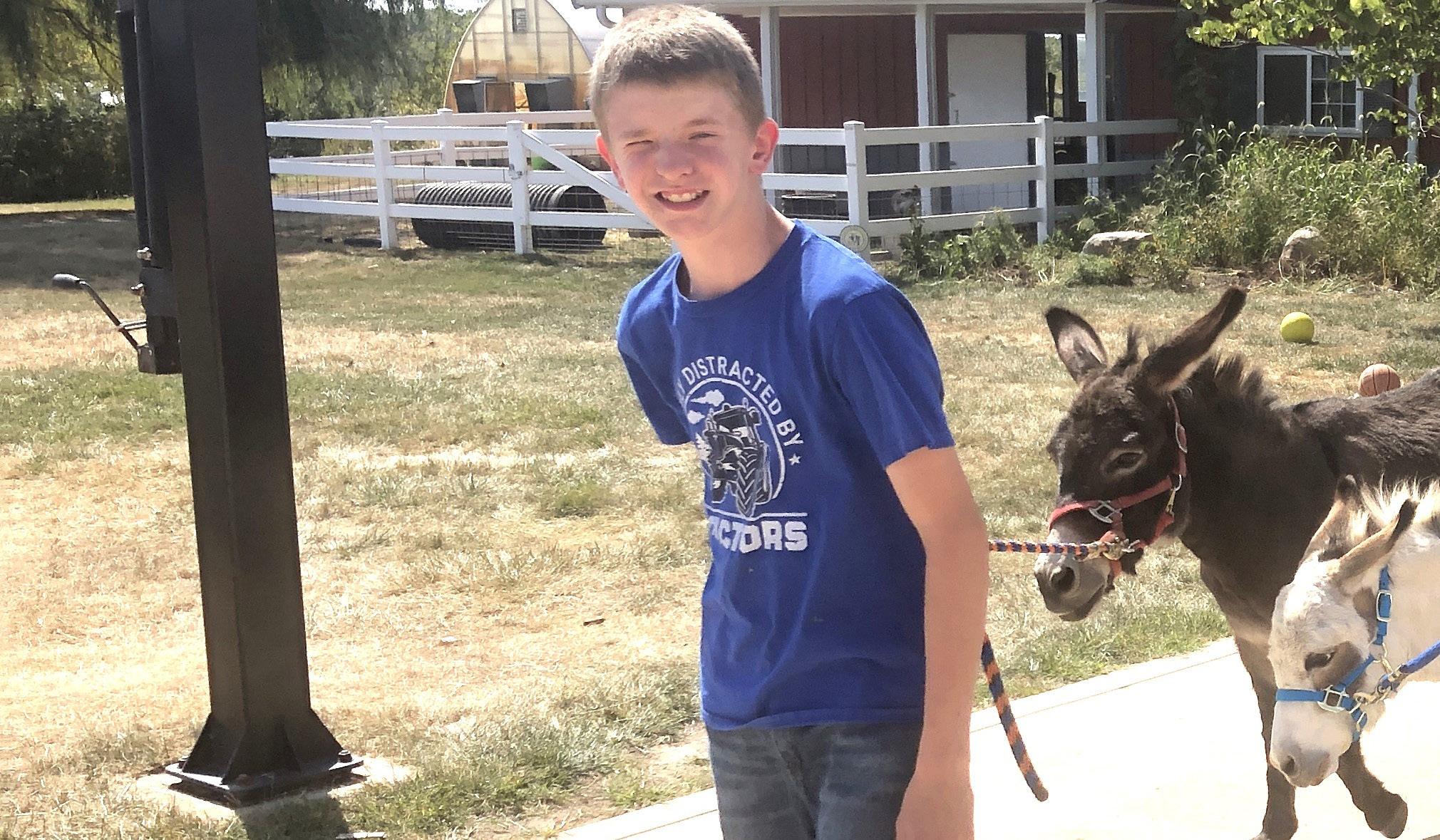
As a middle school teacher, I have the privilege of guiding students through one of the most transformative stages of their lives. Adolescence is a time of exploration, growth, and the gradual development of independence. In the Montessori philosophy, this journey toward personal independence is supported by the concept of “Care of Self,” which plays a critical role in helping students make choices, build responsibility, and develop self-awareness.
Montessori education places great emphasis on the idea that children are naturally inclined toward independence. At every stage of development, from early childhood through
adolescence, students are encouraged to take ownership of their own actions and responsibilities. For middle school students, this concept takes on new significance as they are given more freedom and responsibility for their personal care, both physically and emotionally.
In a Montessori classroom, students are given the freedom to make choices about their learning, environment, and self-care. This freedom is not without structure or limits, but rather designed to teach them how to make responsible decisions. When students are allowed to choose, whether it’s how they organize their time, the order in which they
complete assignments, or even how they take care of their personal hygiene, they learn to weigh consequences, prioritize, and manage their lives in ways that will benefit them beyond the classroom.
For example, middle school students at OFMS have some freedom to choose when they take a break or work on a specific project. With this freedom comes the responsibility to ensure that they meet deadlines and maintain focus. The key is that students are trusted to make these decisions themselves, fostering a deep sense of accountability. It’s through this practice that they begin to understand that their choices directly impact their



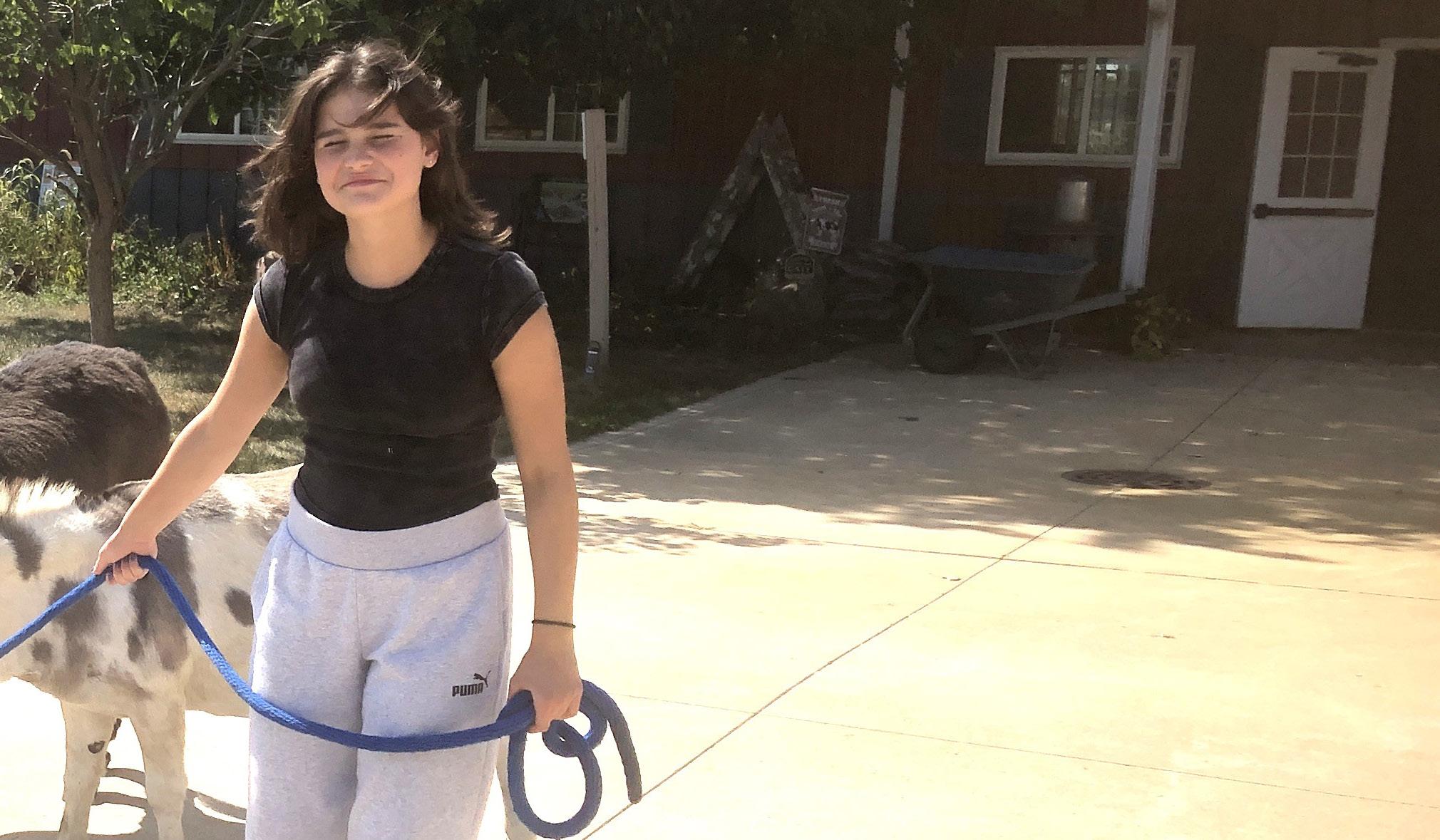
personal success and wellbeing.
“Care of Self” extends beyond personal hygiene and physical health. It encompasses emotional well-being, mental health, and the development of a strong sense of self-worth. Middle school students are at an age where peer pressure, selfimage, and social dynamics can heavily influence their confidence and identity. By encouraging care of self, we help them develop resilience and a healthy relationship with their own abilities and limitations.
Personal independence in a Montessori classroom is cultivated gradually, with students being
given increasing levels of responsibility as they demonstrate readiness. This scaffolding approach allows students to develop confidence in their abilities without feeling overwhelmed by too much responsibility, too soon. By the time they reach middle school, many students are ready to take on substantial responsibilities, such as managing group projects, leading class discussions, or even making decisions about how to run the farm.
The middle school staff understands that independence is not a onesize-fits-all concept. Some students may thrive with more freedom, while others
may need additional support. The beauty of the Montessori approach is that it meets students where they are, giving them the space to grow at their own pace while still challenging them to step outside their comfort zones. Ultimately, “Care of Self” is about more than just teaching students how to take care of their physical needs; it’s about empowering them to take control of their lives in meaningful ways. By giving middle school students the freedom to make choices, and the tools to develop personal independence, we prepare them not only for academic success, but for life beyond the classroom.

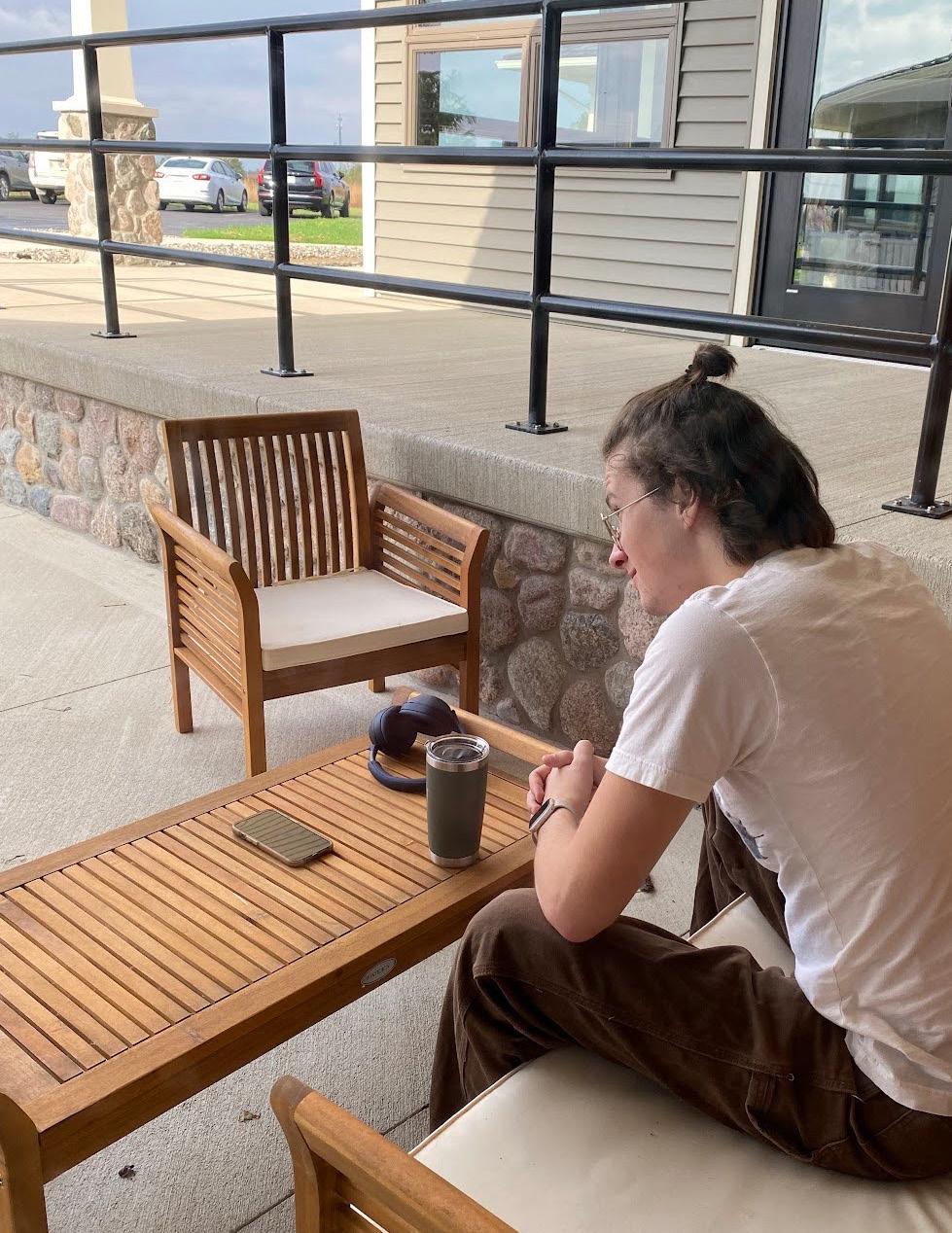

Where space and time meet
jon agler, high school administrator
“Young people must have enough freedom to allow them to act on individual initiative” Maria Montessori
Dr. Montessori’s words guide us as we provide an environment that supports adolescent needs and meets the needed rigor for each curriculum. A key part of our scheduling focuses on uninterrupted work time, or cycle work time. At the Secondary level, the schedule should allow for uninterrupted work periods. This time honors student choice, fosters concentration, and supports student engagement in work. The critical aspect is encouraging flexibility within these extended blocks of time. Students are taught to use a checklist and to plan their work time to be able to meet deadlines. This includes independent work, small-group work, self-checking work with controls or other methods, and project work by individuals or groups. The teacher/guide is working with/among students. Brief, student-focused, large-group activities may occur during the work cycle. These activities include the active engagement of the teachers (American Montessori Society, 2024).
At Oak Farm Montessori High School, we call this ‘Cycle Work Time’. This allotted period is for students to learn how to manage their space and their time. We feel that this flow is essential to support the development of their executive functioning skills and autonomy, and finding overall success in their school work. Teachers are actively engaging with students during this time, encouraging them and supporting those lacking time management skills. As we look to prepare our students for the next plane of development, we see this as a pivotal part of our programming. Whether students choose to go into college or directly into the workforce, these skills are paramount to their success



